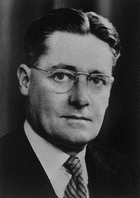Howard Florey is as linked to penicillin as Sir Alexander Fleming is. Howard Florey, who developed a way of mass producing penicillin, should be seen as being as important as Jenner, Koch, Pasteur and Lister in the history of medicine.

Florey was born on September 24th 1898, in Adelaide, Australia. He died on February 21st, 1968, at Oxford in England. He trained as a pathologist who, with Ernst Chain isolated and purified penicillin (discovered in 1928 by Sir Alexander Fleming) for general clinical use. This mass production of penicillin proved to e vital to soldiers during World War Two where diseases that had previously been difficult to cure in a combat situation could now be treated far more effectively. For this research and achievement, Florey, Chain, and Fleming shared the Nobel Prize for Physiology or Medicine in 1945.
Florey studied medicine at Adelaide and Oxford universities until 1924. After holding teaching and research posts at Cambridge and Sheffield universities, he was professor of pathology at Oxford between 1935 and 1962. He was appointed provost of Queen’s College, Oxford in 1962, and chancellor of the Australian National University, Canberra (1965), positions he held until his death. He was knighted in 1944 and made life peer in 1965.
Florey investigated tissue inflammation and secretion of mucous membranes. He succeeded in purifying lysozyme, a bacteria-destroying enzyme found in tears and saliva, and characterized the substances acted upon by the enzyme. In 1939 he surveyed other naturally occurring anti-bacterial substances, concentrating on penicillin. With Chain, he demonstrated its curative properties in human studies and developed methods for its mass production. Following World War II and the work of his research team in North Africa, penicillin came into widespread clinical use.